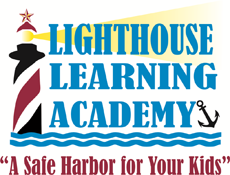STEAM Lab
Lighthouse Learning Academy proudly hosts a STEAM Learning Lab for children ages preschool to school age.
STEAM Learning Labs are engaging, hands-on Science, Technology, Engineering, Art, and Math activities for children. They reinforce school curriculum in a fun and exciting way.
Our lab is equipped with mobile STEM stations, computer stations, a Smart Board, building centers, and a creative expression center.
Science – Children are naturally little scientists. They are inquisitive as to how the world works. Children find patterns and build their own theories to explain what they see and collect “data” to test those theories. Much like scientists, children learn from others. They watch what others do and learn by repeating what they’ve seen or by asking questions and seeing the results.
Technology – Technology in STEAM means any type of man-made object. This includes simple gears and gadgets. With these type of tools, children observe and learn the cause and effect. These simpler technologies afford children the understanding of how tools help us accomplish tasks.
Engineering – Engineering applies Science, Math, and Technology to solving problems. It helps us understand how and why things work by using materials, designing, crafting, and building. Children are actually implementing the rules of Engineering in everyday life. They build and construct using blocks and building bricks. By building forts, they are using critical thinking to help design a structure. All of these are types of Engineering.
Art – (Creative Expression) Art is the “A” component of STEAM. A creative mind is a critical component in STEM. This is why Art was added to STEM to become STEAM. Children enjoy painting, dramatic play, music, and free drawing. Art is a sensorial activity providing children the opportunity to feel the paint on their fingers and see colors change when mixed with others. Research shows that early experience with creative arts supports cognitive development and increases self-esteem.
Math –Math is a tool children use every day! From birth until age five, children explore everyday mathematics, including informal knowledge of “more” and “less,” shape, size, sequencing, volume, and distance. The basic math skills teachers provide in early childhood education set the building blocks for the entire academic career. Math is like a gym for the brain. The process of learning Math boosts brainpower!
